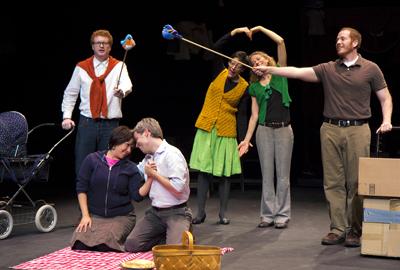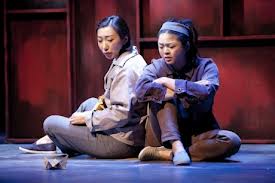|
JACQUELINE LAWTON: Why did you decide to get into theatre? Was there someone or a particular show that inspired you?
JOJO RUF: I don’t really know the answer to this (although I keep getting asked this question, and I should really come up with one!). In my last interview with you I said that by the end of college I was hooked and couldn’t imagine doing anything else. Which I suppose is basically true. JL: How long have you lived and worked as a theatre critic in D.C.? What brought you here? Why have you stayed? JR: I grew up in Takoma Park, and with the exception of my time abroad, I’ve lived in DC all my life. But I’ve only written about theatre (I don’t consider myself a theatre critic, more on that below) for a year. I’ve stayed for a number of reasons, partially because of my family and personal life, and partially because my work has kept me here. But it’s an incredibly generous and warm community – who wouldn’t want to stay!? JL: How do you define the work you do? Specifically, what is the role of the theatre critic in the world of theatre? What contribution do you hope to make in the D.C. Theatre community and the American Theatre? JR: I don’t think of myself as a theatre critic; I don’t write reviews, I don’t judge productions, and I don’t evaluate scripts (although it’s sometimes impossible to prevent my personal view from slipping in, particularly when I’m wildly enthusiastic about a piece). Instead, I write pieces that are published prior to a play’s World Premiere that provide dramaturgy and context for the audience (theatreWashington calls it Audi-Turgy). Producing new work can be a daunting task, and one of the things we talk about time and time again at the National New Play Network with our 50 member theaters is how challenging it is to train your audience to take a risk on a play they’ve never heard of. There are so few theaters in the country (and some of them happen to be here in DC) that have cultivated an audience who will come see a brand new play, hate it, but come back again for the next new thing. The motivation behind starting Audi-Turgy was to help provide context for unknown plays so that an audience member will take that leap. JL: If your work as a theatre critic doesn’t pay the bills, what else do you do? How do you balance this work with your play viewing and criticism? JR: Most of my time is spent as the General Manger of the National New Play Network (NNPN), an alliance of theatres across the country dedicated to the development, production, and continued life of new plays. I also work as the Coordinating Producer for the Laboratory for Global Performance and Politics at Georgetown University, and as a Teaching Artist with Ford’s Theatre. It’s certainly challenging to balance all of these various pieces of my life. Thank goodness for Google calendar! JL: What skills and traits do you feel a successful theatre critic should have when writing about theatre, especially when it comes to new plays? JR: I think a successful theatre critic needs to be able to separate the production from the script. They need to be able to see a play’s potential, and not just what appeared on stage. I think they should also have an intense curiosity, and a desire to dig deep into the world of the play and playwright. JL: What is your writing and viewing process? Do you read the script prior to seeing a production? Do you research the author and/or world of the play? Do you read the program notes? JR: I start by reading a draft of the play – often a relatively early draft – in order both to prepare for the interviews and to know what I’m writing about. I then interview the playwright, and often the director, Artistic Director and dramaturgy (depending on the piece). JL: In the article, “Ohio Critic's Tough Words Elicit Rough Reaction,” Denver Post Theatre Critic John Moore states: “There is no universal rule book for criticism, no how-to manual. My guidelines: Be true to your visceral emotional response, good or bad. State your case and back it up. Be a catalyst for discussion. Encourage dialogue. Don't be personal. Never try to be funny at the expense of someone's feelings.” What guidelines, rules or standards do you have for your own work? Have you always upheld them? If so, at what cost? If not, what shifted the line for you? JR: I try to listen to the story the play wants to tell, rather than what I think would be best prior to reading the script. (And the times I’ve gone in with preconceived notions about the play or the playwright have been the most difficult articles to write.) But my number one rule is: THIS IS NOT A REVIEW. It’s not about whether I like the play or not, it’s about helping to serve the play and the playwright and about providing context for the audience. JL: What is the greatest part of being a theatre critic? What has been your most difficult challenge? JR: I love being able to talk to a playwright about their play. It’s such an exciting experience to be able to sit and ask them about their inspirations, to find out what they’re still grappling with (as a majority of the time they are still knee-deep in rewrites), and to gain insights into the rehearsal process. The tone of that interview shapes the tone of the article itself, and it’s fun to let them drive me and my writing. The biggest challenge is simply time. I go through quite a laborious process, from reading the script to conducting interviews to transcribing interviews to writing the article, and it’s often challenging to fit this in to my already hectic schedule. JL: Who are your favorite playwrights? What is it about their work that inspires or draws you to them? JR: Oh goodness. This is a constantly expanding list: Federico Garcia Lorca, Tony Kushner, Naomi Wallace, Aditi Brennan Kapil, Brian Friel, Sarah Kane, Tennessee Williams, Sarah Ruhl. The list goes on and on. I’m drawn to plays that are lyrical and strange and fantastical and stimulating. I could read any of these playwrights’ work again and again and discover something new each time, and I love nothing more than a play that keeps me up at night, one that continues marinating long after the final scene. JL: DC artistic directors are... JR: Becoming more bold and exciting. JL: DC actors, designers and directors are ... JR: Amazing at engaging with new work. JL: DC playwrights are ... JR: Excitingly diverse in aesthetic and style. JL: DC audiences are ... JR: Smart and curious. JL: How do you feel the DC theatre community has addressed the issues of race and gender parity? How has this particular issue impacted you and your work? JR: Wow. This is quite a question. Honestly? I think we are having some fascinating conversations around these issues (both within DC and nationally), but I think we still have a ways to go on our journey. JL: What advice do you have for an up and coming DC based theatre critic who has just moved to the area? JR: See as many plays as you can and read and write as much as possible. Start a blog! Put yourself out there. And know that the only way you’ll get better at writing is by practicing.
0 Comments
Your comment will be posted after it is approved.
Leave a Reply. |
My BlogI'm a playwright, dramaturg, and teaching artist. It is here where you'll find my queries and musings on life, theater and the world. My posts advocate for diversity, inclusion, and equity in the American Theatre and updates on my own work. Please enjoy!
Categories
All
Archives
June 2020
Reading List
|



